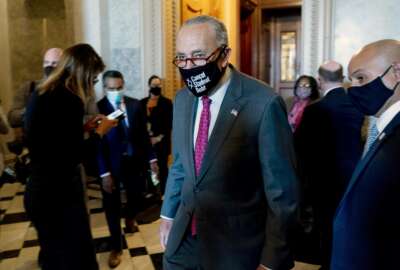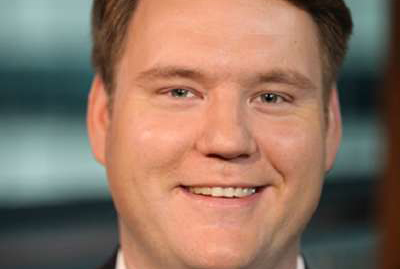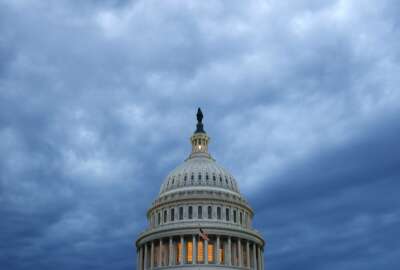Another potential government shutdown looms as the fiscal year starts to draw to a close
There are real questions about the duration of a likely continuing resolution, and whether it’ll be long enough to avert a government shutdown.
Best listening experience is on Chrome, Firefox or Safari. Subscribe to Federal Drive’s daily audio interviews on Apple Podcasts or PodcastOne.
As the end of another fiscal year starts to approach, it won’t be a surprise federal agencies if the next one begins under a continuing resolution. They’ve gotten very, very used to it over the last many years. But this time there are real questions about the duration of that CR, and whether it’ll be long enough to avert a government shutdown. Larry Allen is president of Allen Federal Business Partners. He joined the Federal Drive with Tom Temin to talk about what might be ahead.
Interview transcript:
Jared Serbu: And Larry, it’s been a while but it looks like we do have a combination of debt ceiling crisis and government shutdown possibility converging again, which we haven’t had together in a while. Why do you think these are real possibilities and real threats this year?
Larry Allen: Jared, I think this is a real threat this year, because we have a very contentious Congress, one where each house has very narrow majorities. We’ve also just had the Senate pass a large spending bill, the House is going to take that up very shortly. There are going to be fiscal conservatives who want to have a say in whether or not that money actually gets allocated. We have this triple witching hour that’s converging. All of the spending bills are up for passage, some have been passed. We have the end of the fiscal year coming up, which will need in all likelihood a continuing resolution and not an appropriations bill. And then in October and a yet undefined time, the Congress is going to have to vote to increase the debt ceiling. On paper anyway, Jared, that’s a vote that requires 60 votes in the Senate. Those votes really just aren’t there right now. That’s why I think that this is a time when we could really see a government shutdown sometime, right after the start of the fiscal year. It’s unrealistic to think that we’re going to get a long term continuing resolution, when there’s this political football, the debt ceiling, over top of everything. So I think that everybody’s going to have to strap in their seats. This one could actually be a long one.
Jared Serbu: Yeah, I was gonna ask you about that next. I mean, I think the conventional wisdom has been that we’re going to be in car mode for at least some time, but you think there’s a realistic possibility that congressional Republicans may not even want to go along with the CR, or at least a long one?
Larry Allen: Jared, I think they’re going to do a short term CR probably the meaning of the year because the debt ceiling boat, as I said, that says yet untimed, we’d haven’t really heard from the Treasury what the last day is before action is absolutely needed. That’s probably going to drive how long a CR is, I think, in my estimation, so it would be two or three weeks, and then that probably would see some CR tied to a debt ceiling vote. And that’s where the fireworks really start. Tough to say, but I think there’s going to be an awful lot of desire to claw back some of the spending that the Senate recently authorized and the House is going to have to go along with. This is a very tense time, there’s not a lot of bipartisanship in Congress. It’s been several years since we’ve had a shutdown that’s lasted more than a day or two. But this time, we could have one, I think for a little while. And as for appropriations, I’m not really forecasting an appropriations bill until the end of January at the earliest.
Jared Serbu: Interesting. Alright, let’s let’s move on to a completely different topic here, which is small business goals for 2020. As you write in the newsletter, governmentwide the goal was met but some shortcomings when it comes to small businesses, and HUBZones. What actions can we expect agencies to take in reaction to falling short on those specific goals?
Larry Allen: In Jared, even though we’re talking about FY 20 numbers, and we’re almost at the end of FY 21. I think we can expect these numbers that recently came out to drive spending into FY 22, as well. That’s particularly true on top of the administration’s plans to increase small minority contracting by 50%. So what I’m expecting, where were the shortcomings, well, they were in women owned small business use and in HUBZone use. HUBZones have been kind of a difficult target for the government to meet over the last couple of years, Jared, because it’s tough to to find a number of businesses that can meet the kind of strict criteria. Sometimes you’re in a HUBZone, sometimes the HUBZone program works, son of a gun, the place where your business is located no longer qualifies. So in that way, that’s a program success. But on the other side it poses challenges for meeting that HUBZone goal. So I think we can expect to see federal agencies well into FY 22, to focus on small minority business contracts, women owned and HUBZone business contracts especially. Whether you’re large or small business, this is gonna affect at least somewhat how you go to market, who you want to partner with agency acquisition strategies. So I’m advising contractors to pay attention to what’s in their pipeline, that program that may be full and open competition right now, might go to small business set aside in a couple of months. So you got to watch that.
Jared Serbu: Well, one of the numbers you flagged for us is that the HUD figure which is as you say, only 1.7% of their covered contracts went to small businesses, their goal was 25%. And I noticed SBA has adjusted their goal for this year, downward all the way down to 5%. Do we have any idea what happened with HUD? Was this some kind of weird COVID distortion?
Larry Allen: Yeah, that could very well be part of that, Jared. It’s very typical to see an agency miss its small business target by that much. And it could very well have been something that had to do with market conditions. Or it could very well been that HUD was going along, doing acquisition and really keeping their eye on the small business goal. Rest assured, they will be keeping their eye on that goal moving forward. What it looks like is that the SBA has had a conversation with senior leaders, leaders who said, “look we probably were a little overly optimistic previously, here’s a somewhat more realistic target for what we can make.” I would expect to see HUD work towards that 5% number, probably get some good oversight from Congress in helping them meet that goal. And then I would expect to see that goal revised somewhat upward in the out years.
Jared Serbu: All right. Larry Allen is president of Allen Federal Business Partners. Larry, thanks as always.
Larry Allen: Jared, thank you and I wish your listeners happy selling.
Copyright © 2024 Federal News Network. All rights reserved. This website is not intended for users located within the European Economic Area.
Tom Temin is host of the Federal Drive and has been providing insight on federal technology and management issues for more than 30 years.
Follow @tteminWFED






